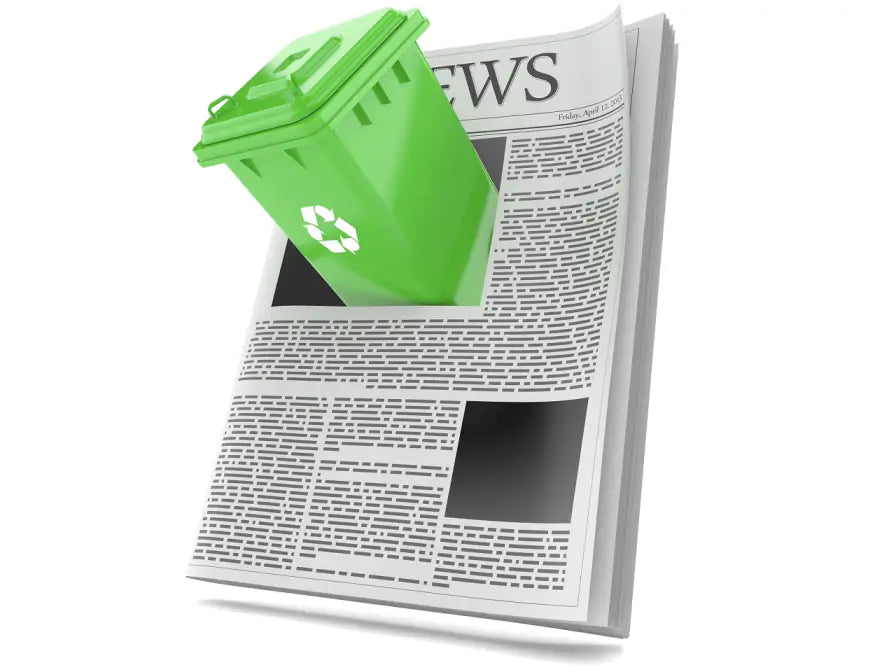Your basket is currently empty.
Shop NowRecycling Roundup 12th February

Recycling Roundup 12th February
Local authority waste management statistics in Northern Ireland show that the country’s recycling rate has risen, from 48.4% to 51.5% in just over a year. The Department of Agriculture, Environment and Rural Affairs (DAERA) has just released the quarterly figures, which show the key information about the state of waste management in the country. The main findings were that:
- Northern Ireland’s councils collected 260,353 tonnes of municipal waste between July and September 2017, which is 2.7% lower than the amount that was collected in the same 3 months of 2017.
- Household waste accounts makes up 89.8% of municipal waste. Fermanagh, Omagh, and Belfast produced the smallest amount of household waste per person at 109kg, whilst the largest amount of waste per person was produced in Antrim and Newtownabbey at 149kg.
- The household waste that was collected for reuse, dry recycling and composting was 51.5% between July and September 2017, which is an increase on the 48.4% that was collected during the 3 months of 2016.
- Recycling rates vary across the country, from 45.2% in Causeway Coast and Glens to 57.5% in Mid and East Antrim.
- The amount of energy recovered from waste was 18.4%, which is similar to the 17.9% recorded for July to September 2016. Rates varied from the highest amount of 50.2% in Newry, Mourne and Down, to the lowest of 5.1% in Lisburn & Castlereagh.
- The amount of household waste that was sent to landfill was 29.5%, a reduction on the 33.4% recorded in 2016.
Carpet Recycling UK (CRUK), the body which represents sustainable carpet producers, has announced that the volume of carpet waste that was reused, recycled, or recovered for energy rose to 42% last year, which is an increase from 35% in 2016. This means that 168,000 tonnes of carpet was saved from landfill in 2017.
The figures are a huge improvement when you consider that barely any carpet was being reused or recycled 10 years ago, and the industry is making strides towards a goal to divert 60% of carpet from landfill by 2020.
124,000 tonnes of carpet were used for energy recovery, and it’s fast becoming a viable alternative to using fossil fuels in cement kilns and incinerators.
Carpets are being increasingly used in the equestrian industry as surface materials, and carpet tile reuse schemes have also boosted the total amount of carpet being recycled.
CRUK say that they have also seen an increase in interest in carpet recycling, and some industry leading companies have worked to promote sustainability in the sector, including increasing people’s awareness of the fact that carpet is a valuable raw material which can be reused in a number of ways.
To find a carpet recycling company near you, visit: http://www.carpetrecyclinguk.com/find_a_recycler_near_me.php

Residents in South Lakeland in Cumbria that currently receive a recycling service will soon be able to recycle card and plastic. Some residents that live in rural locations haven’t been able to access the collections so far as they live in a remote place that refuse vehicles couldn’t get to.
The council’s teams have been working hard to find the solution to this problem, and now they’re able to offer the service to residents in remote areas by using smaller vehicles. The residents will receive a blue reusable recycling bag for their recycling from the middle of February, and this will be collected alongside the existing recycling boxes and green waste.
The council will have achieved their target of rolling out a recycling service to 100% of residents in the district, and as they have expanded their recycling services, the amount of waste collected has increased accordingly. Nearly 60 more tonnes of recycling were collected in December compared with the same month 3 years ago.
To be able to reach all residents with the extended service, the council have had to revise collection rounds, bring in new vehicles, and deliver new recycling bags and information to 53,000 households. The service was expanded as the result of talking to residents and the council’s commitment to increase the range of recyclable items that they collect from the kerbside and send off for recycling.
The council also wants to reassure residents that they don’t send recycling to the incinerator or landfill. They say that if recycling is sorted, it goes to a plant and is transformed into energy.
